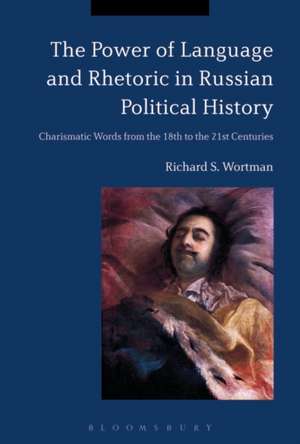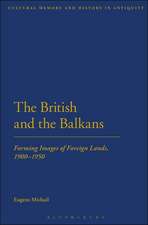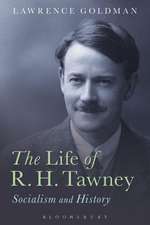The Power of Language and Rhetoric in Russian Political History: Charismatic Words from the 18th to the 21st Centuries
Autor Professor Emeritus Richard S. Wortmanen Limba Engleză Paperback – 29 mai 2019
| Toate formatele și edițiile | Preț | Express |
|---|---|---|
| Paperback (1) | 231.06 lei 43-57 zile | |
| Bloomsbury Publishing – 29 mai 2019 | 231.06 lei 43-57 zile | |
| Hardback (1) | 715.50 lei 43-57 zile | |
| Bloomsbury Publishing – 29 noi 2017 | 715.50 lei 43-57 zile |
Preț: 231.06 lei
Preț vechi: 297.21 lei
-22% Nou
Puncte Express: 347
Preț estimativ în valută:
44.21€ • 46.29$ • 36.58£
44.21€ • 46.29$ • 36.58£
Carte tipărită la comandă
Livrare economică 07-21 aprilie
Preluare comenzi: 021 569.72.76
Specificații
ISBN-13: 9781350112360
ISBN-10: 1350112364
Pagini: 256
Ilustrații: 1 b/w illustration
Dimensiuni: 156 x 234 x 14 mm
Greutate: 0.36 kg
Editura: Bloomsbury Publishing
Colecția Bloomsbury Academic
Locul publicării:London, United Kingdom
ISBN-10: 1350112364
Pagini: 256
Ilustrații: 1 b/w illustration
Dimensiuni: 156 x 234 x 14 mm
Greutate: 0.36 kg
Editura: Bloomsbury Publishing
Colecția Bloomsbury Academic
Locul publicării:London, United Kingdom
Caracteristici
Draws attention to the understudied intersection between politics, ideology, sensibilities and political thought and power
Notă biografică
Richard S. Wortman is Bryce Professor Emeritus of History at Columbia University, USA. His recent books include the two-volume Scenarios of Power: Myth and Ceremony in Russian Monarchy (1995 and 2000) and two collections of articles, Visual Texts, Ceremonial Texts, Texts of Exploration: Collected Articles on the Representation of Russian Monarchy (2014), Russian Monarchy: Representation and Rule (2013). The second volume of Scenarios was awarded the American Historical Association's George L. Mosse Prize in 2000, and in 2006 both volumes received the Efim Etkind Prize of St. Petersburg European University for the best book of a western scholar on Russian literature and culture.
Cuprins
Author's Preface and Acknowledgements 1. Introduction; Kul'turnost' and the Rhetoric of Proper Conduct 2. The Rhetoric of Consent: Radost', Liubov', Umilenie and Vostorg3. Lichnost' and the Rhetoric of Duty: The Ethos of Service4. Lichnost' and the Rhetoric of Duty: In Quest of New Ideals5. Pravda and the Rhetoric of Moral Transcendence6. Tselost' (Geographical Integrity) in the Rhetoric of the Russian StateBibliography
Recenzii
Given present day revelling in, or abhorrence of, "fake" news, alternative "facts" and tweeted gibberish at the highest political levels, this work is timely . We hear it said often today that words are important. This book demonstrates that they always were.
We historians have been talking about a "linguistic turn" in scholarship for many years now . [But] few have really made this turn. Wortman has. He reminds us, in this fine intellectual and cultural history, that the actual words matter.
The book is a unique contribution to our understanding of the long durée history of manifestations of power and authority in the Russian Empire, thus, scholars of this period will ?nd its ?ndings particularly illuminating and insightful.
A wonderful contribution to intellectual and cultural history of pre-revolutionary Russia, whose focus on the 'charismatic words' creates useful signposts for one's journey through the many pages of original writings. It should be indispensable to cultural historians and students of eighteenth- and nineteenth century Russian literature, philosophy, and intellectual culture.
Richard Wortman has spent a lifetime thinking about Russian political culture and this fine book brings together many of his sharpest insights in original and persuasive form.
It charts a previously neglected realm in the history of modern Russia. Richard Wortman captures an elusive reality - that of politically charged polyvalent words, specific uses of which were capable of generating individual or collective feelings, affections and allegiances. The book is destined to serve as an eye-opener for many a student of Russian politics and culture.
We historians have been talking about a "linguistic turn" in scholarship for many years now . [But] few have really made this turn. Wortman has. He reminds us, in this fine intellectual and cultural history, that the actual words matter.
The book is a unique contribution to our understanding of the long durée history of manifestations of power and authority in the Russian Empire, thus, scholars of this period will ?nd its ?ndings particularly illuminating and insightful.
A wonderful contribution to intellectual and cultural history of pre-revolutionary Russia, whose focus on the 'charismatic words' creates useful signposts for one's journey through the many pages of original writings. It should be indispensable to cultural historians and students of eighteenth- and nineteenth century Russian literature, philosophy, and intellectual culture.
Richard Wortman has spent a lifetime thinking about Russian political culture and this fine book brings together many of his sharpest insights in original and persuasive form.
It charts a previously neglected realm in the history of modern Russia. Richard Wortman captures an elusive reality - that of politically charged polyvalent words, specific uses of which were capable of generating individual or collective feelings, affections and allegiances. The book is destined to serve as an eye-opener for many a student of Russian politics and culture.










